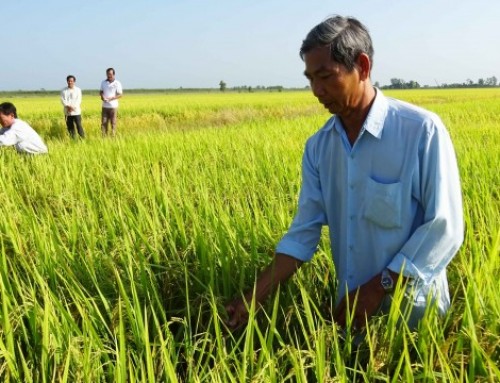From mango orchards to consumers: Value chain analysis makes sure we all get our juicy bits

Vietnamese participants learned how they were linked in a value chain of mango to understand their roles and relations in developing mango production in Vietnam.

Mongo farmers, collectors, processors, cooperative members and government representatives together learn to analyse the value chain of mango in Vietnam.
Twenty actors in the value chain of mango participating in a one-day workshop “Value Chain Analysis of Mango” in Dong Thap Province included farmers, collectors, processors, cooperative members and also some government representatives.
At the workshop, the ‘Link Methodology’, based on the GIZ value links approach, was applied with the aim of getting a participatory understanding of the value chain, the business model that the different actors follow, and the degree of inclusiveness of the small-scale farmers within the value chain. To be inclusive, all actors in the value chain must be equally treated.
The participants were introduced to ‘Mapping the Value Chain’, a technique for the value chain analysis to allow participants to discuss together all the activities taking place from the mango orchard to the final consumer. From this activity, the participants were able to visualize the macro context of the mango market, understand the structure of the value chain, and identify where in the chain they involved in and interlinked. Through an open dialogue the participants expressed their concerns as followings:
“We don’t know what the customers need and we do not know what to do or change.”
“There are many persons buying mango and everyone is requesting different product characteristics. If we follow only one, we run the risk of not being able to sell all the products and then not being able to sell the remaining to somebody else.”

Through mapping of the value chain, the participants discuss all the activities taking place from the mango orchard to the final consumer.
During the workshop, the participants formed four groups according to the type of stakeholder they belonged to: farmers, collectors, farmers’ members of a cooperative, and management board personnel of the cooperatives. The groups created a detailed description of all the links, activities and actors involved in their businesses allowing specifying where to focus intervention efforts that would leverage other links in the value chain.
At the end, the participants filled scorecards with statements that measure the level of inclusiveness among the actors’ relationship. This exercise helped farmers to understand their current situation and identify possibilities of improving their negotiation power with reference to other actors such as collectors. The activity helped them to realize that all actors were working on their own and had no coordination to strengthen their businesses.
Here were some reflections from the farmers:
“One problem is that we do not have contacts with anybody else but with collectors.”
“The only thing we discuss with the collectors is the prices, nothing else.”
“We do not believe in cooperatives.”
“We do not understand why the purchasing price of the cooperative is the same as the collector.”
And, the statement from one collector who participated in the workshop was following:
“I must frequently call the farmers and pay some money in advance to ensure that they will sell to me and not to another collector.”
The workshop results provided an understanding of the mango value chain which in turn would allow tailoring future interventions for a stronger integration and improvement of the relations between the different actors.
The workshop took place in Tinh Thoi Commune, Cao Lanh City on 2 June 2016.
[wpdm_package id=’1162′]
By ASEAN Sustainable Agrofood Systems Vietnam Team





